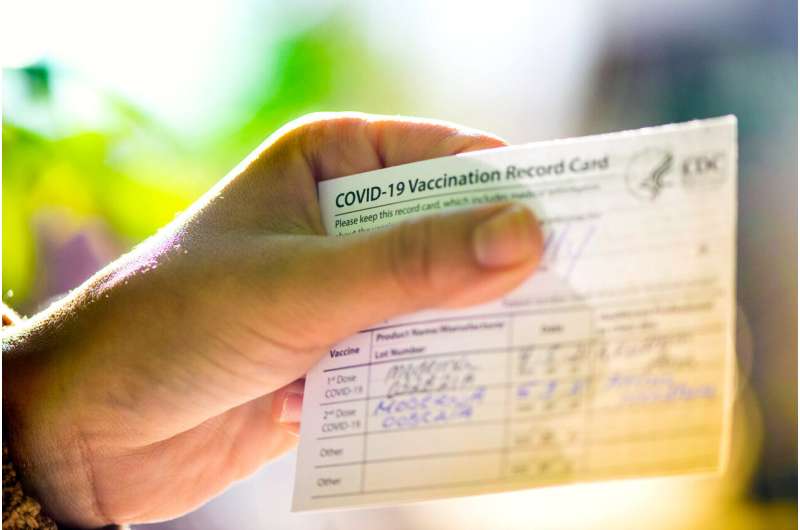
Where is your COVID-19 vaccination card? Is it in your wallet or purse? Is it at home, buried in a pile of mail? Is it lost?
If you’re not sure, you’re not alone.
“It’s tucked away at home, I think,” said Northeastern student Kenny Nguyen, who was hanging out with friends near Centennial Common on Northeastern’s Boston campus this week. “It’s in my dorm.”
“I have it in my wallet,” fellow student Emily Xu said.
“I have no idea. My parents have it,” Skye Toral said. “I’ve never used it.”
Do we still need to hold onto COVID-19 vaccination cards? While many COVID-19 restrictions have been lifted, including in Boston, the Centers for Disease Control and Prevention still recommends holding onto your card and taking a photo of it. However, since the card is no longer required in so many places, some are left wondering: why bother?
“I have mine with me, but I haven’t used it in ages,” Northeastern student Deanna Turner said.
Jared Auclair, a vice provost at Northeastern’s College of Science, recommends keeping your card at hand.
“Yes, folks should still hang onto your vaccine cards,” he said. “Most places aren’t requiring proof of vaccination at this point, but there are some meetings, spaces and locations that are.”
Auclair said he’ll bring his card for his upcoming trip to Europe, though his country of entry doesn’t require it. International travel is one situation where you might need your card. According to Kayak, 128 countries will allow you to enter without proof of vaccination, a negative test or a quarantine period, and 55 countries will allow travelers in without a vaccine card as long as they can show proof of a negative test.
For example, if you go to Bolivia, you may need to show a vaccination card; if you don’t have one with you, proof of a negative test will do. To enter the United States, meanwhile, all noncitizens and nonimmigrants need to show proof of vaccination.
Schools, universities and employers also may require proof before your first day. Major universities like Northeastern generally require vaccination and booster shots; meanwhile, adult education centers may require a vaccination to enroll, as does The Cambridge Center for Adult Education, they confirmed in a phone call, and the Boston-based writing school GrubStreet. By law, employers can require proof of vaccination as well. However, no states require vaccinations for public school students.
As for stores, restaurants, gyms and bars, the city of Boston lifted a controversial vaccination card requirement in February. However, any business can require people to have a card in hand, and even performing artists can require proof of vaccination from attendees.
It’s a good idea, then, to always go out assuming that you’ll need your card, at least for the time being. That came in handy for Northeastern student Sasha when she went to a bar about a month ago. While she says it was a “very rare situation,” she needed the picture of her card on her phone to gain entry. Meanwhile, her friend August needed to show proof of vaccination to participate in a community organizing event a couple weeks ago.
If you lost your card, the CDC recommends contacting your vaccine provider to get a new one. And if you run out of space on your first card, you can receive a second one.
While it’s a good idea to have one now, the paper cards aren’t likely to live much longer, says Brandon Dionne, assistant clinical professor at Northeastern’s Bouve College of Health Sciences. He notes that six states have enacted laws that are pro-proof of vaccination, either allowing it to be required or creating digital vaccination systems. California, for example, launched the Digital COVID-19 Vaccine Record portal so residents can have digital access to proof of vaccination. As Dionne notes, these digital systems render the paper versions obsolete in those states.
“Additionally, all states have at least one regional or local immunization information system (IIS) that maintains records of vaccines,” Dionne said. “So if proof of vaccine was ever needed, it may be possible to get the information from the IIS in the state where you received your COVID-19 vaccines.”
Auclair, for his part, carries a digital vaccine card in the wallet on his iPhone.
Of course, requiring proof could become moot in the future, as getting a COVID-19 booster may become an annual ritual that doesn’t merit a record.
Source: Read Full Article


